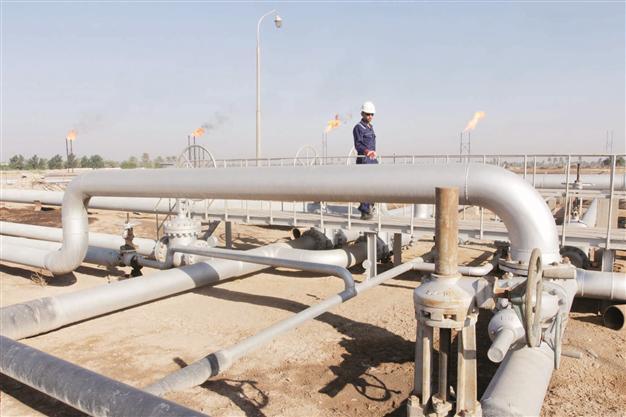Iraq oil key for Turkey, says energy minister
ISTANBUL

The daily oil demand of the world will increase by 14 million barrels by 2040 and most of this demand will be met by Middle Eastern countries, mainly by Iraq, according to the IEA forecasts.
Turkey is about to make new deals with new companies, which will be of great importance to Iraqi oil, Energy Minister Taner Yıldız said at the launch meeting of the World Energy Outlook 2014 report of the International Energy Agency (IEA) yesterday, as reported by Anadolu Agency.
“We are about to make new deals with new companies regarding Iraqi oil,” he said, without giving more details.
He also added Turkish authorities will hold a high-level strategic cooperation meeting with Iraqi Prime Minister Haider al-Abadi during his upcoming visit, where further details will be discussed.
“The IEA expects the daily oil demand will increase by 14 million barrels by 2040, of which 4 million barrels will be provided by Iraq. Turkey cannot be indifferent to this,” he added.
“In the framework of our deals with Baghdad and Arbil, we will see an increase in trade with Iraq. We have a better understanding of how appropriate these deals are. Iraq’s instability affects us; Iraq’s stability therefore matters a lot to us. Turkey will continue to make the biggest contribution to the normalization of Iraq, as we do today,” he noted.
The IEA expects a dramatic decrease in energy investments in Brazil and the U.S. in 2015, but a dramatic increase in the world’s oil demand amid plunging oil prices, said IEA chief economist Fatih Birol during his presentation.
“This will increase the demand, especially for Middle Eastern oil, pushing the prices up in the forthcoming period. The IEA expects the daily oil demand to increase by 14 million barrels by 2040, and most of this amount to be met by the Middle East,” Birol said.
More investments need to be started today in the Middle East to meet the increasing oil demand, he noted.
“However, we didn’t see the appetite for more investment in many countries. Iraq is the most crucial country in the region with its fairly rich oil sources, but it is open to question whether the country will be able to increase its oil output due to the Islamic State of Iraq and the Levant [ISIL] attacks and other political risks,” he added.
Iraq plans to boost its crude production to 4 million barrels a day (bpd) next year, Reuters reported. Kurdistan Regional Government (KRG) Energy Minister Ashti Hawrami told a conference in London on Dec. 17 the pipeline to Turkey could carry 800,000 bpd next year, including 550,000 bpd to be marketed by Baghdad under a first-stage deal reached earlier this month.
Hawrami said he saw Kurdish-produced oil shipments on its pipeline to the Turkish Mediterranean port of Ceyhan rising to 500,000 bpd by the end of the first quarter of 2015 from the current levels of around 400,000 bpd.
The KRG will give 250,000 bpd of Kurdish crude to the federal State Oil Marketing Organization (SOMO) under the terms of a draft 2015 federal budget. Hawrami said Arbil would be a net contributor to Iraq’s finances by the end of next year.
The KRG will market the remainder of its oil independently, Hawrami said. He added that the KRG will also allow an estimated 300,000 bpd of crude from fields in the disputed province of Kirkuk to be exported through the KRG’s pipeline under SOMO.
